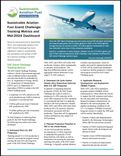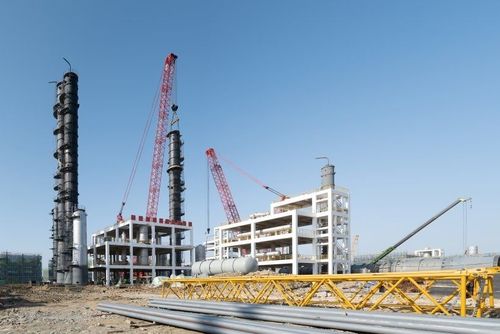DOE highlights progress on SAF Grand Challenge, offers $12M to support biorefinery scale-up



SOURCE: U.S. Department of Energy
September 11, 2024
BY U.S. Department of Energy
Today, an interagency team led by the U.S. Department of Energy, U.S. Department of Agriculture (USDA), and U.S. Department of Transportation's Federal Aviation Administration (FAA) released the Sustainable Aviation Fuel (SAF) Grand Challenge: Metrics Dashboard Fact Sheet. USDA Secretary Thomas Vilsack made the announcement at the North American SAF Conference & Expo in St. Paul, Minnesota. The Metrics Dashboard Fact Sheet summarizes actions and progress to help drive innovation and expand the production and use of SAF to meet the SAF Grand Challenge target of 3 billion gallons of SAF in the United States by 2030.
Developing innovative technologies to produce SAF will enable the United States to meet its domestic climate goals for the U.S. bioeconomy. The new Metrics Dashboard Fact Sheet includes key accomplishments from federal agencies:
- Domestic SAF use has grown 10x. Since the SAF Grand Challenge was announced in 2021, annual SAF production and imports have grown from 5 million gallons to 52 million gallons through the first six months of 2024.
- We have a pathway to meet the ambitious 2030 SAF Grand Challenge target. Based on active projects, between 2.6 and 4.9 billion gallons per year of SAF may be produced domestically by 2030, creating a clear pathway to achieve the SAF Grand Challenge near-term goal.
- U.S. SAF production is cutting emissions. More than 300,000 metric tons of CO2 have been reduced through June 2024 with U.S. SAF production.
SAF production and growth not only powers aircrafts while shrinking the carbon footprint and reducing pollution, it also generates American jobs by boosting domestic manufacturing and economic development in farming communities by constructing cutting-edge biorefineries. Due to its technical leadership, the United States also has the potential to be an exporter of SAF technology to support other countries in their efforts to decarbonize aviation globally.
“Increasing domestic production of sustainable aviation fuel is critical to achieving our national climate goals and will position the U.S. as a global leader in this emerging market,” said Alejandro Moreno, Associate Principal Deputy Assistant Secretary for the DOE Office of Energy Efficiency and Renewable Energy. These federal agency efforts and investments in sustainability for the U.S. aviation sector will also fuel the U.S. economy, strengthen national security, and create a more secure energy future for all Americans.”
Advertisement
Advertisement
“The FAA is committed to doing its part in helping the aviation industry decarbonize and meet our goal for net-zero carbon emissions by 2050 as set forth in the U.S. Aviation Climate Action Plan,” said Laurence Wildgoose, Assistant Administrator for Policy, International Affairs, and Environment, Federal Aviation Administration. “The SAF Grand Challenge will enable the scale up of SAF production in the U.S., which is critical to achieve decarbonization of the aviation sector.”
“In the agriculture sector, we’re expanding opportunities for farmers, business owners, and rural communities by powering the nation’s aviation sector with fuel grown by hard-working Americans,” said Agriculture Secretary Tom Vilsack, United States Department of Agriculture. “By powering aviation through low-carbon fuels, farmers can earn extra income, tap into value-added climate smart-agriculture markets, and meet the demand for an aviation industry that seeks to accelerate sustainable production. Together, through interagency and industry collaboration, we will successfully meet the SAF Grand Challenge goals and greatly reduce greenhouse gas emissions to transition to a more sustainable future.”
The U.S. transportation sector has become the largest source of CO2 emissions in the country with aviation generating approximately 11% of U.S. transportation-based CO2 emissions that contribute to climate change. SAFs made from renewable biomass and waste resources have the potential to deliver the performance of petroleum-based jet fuel but with a fraction of its carbon footprint, giving airlines opportunity to reduce greenhouse gas (GHG) emissions from flight operations. DOE’s Bioenergy Technologies Office (BETO) empowers energy companies and aviation stakeholders by supporting advances in research, development, and demonstration (RD&D) to overcome barriers for widespread deployment of low-carbon fuels.
Advertisement
Advertisement
Learn about SAF and download the Sustainable Aviation Fuel Grand Challenge: Tracking Metrics and Mid-2024 Dashboard Fact Sheet.
FY24 Scale-Up of Integrated Biorefineries Funding Announcement
Supporting the SAF Grand Challenge, BETO also announced today $12 million in funding to support the advancement of integrated biorefinery technologies to decarbonize the transportation and industrial sector. This funding opportunity announcement (FOA), FY24 Scale-Up of Integrated Biorefineries, will help reduce technology uncertainty and demonstrate bioenergy technologies that produce low carbon intensity biofuels and biochemicals, particularly SAFs, using biomass and waste resources.
The FOA aims to accelerate cost-shared RD&D projects with partners in industry, academia, and DOE national laboratories. Selected projects will be focused on the design, construction, testing, and verification of new technology and feedstock pathways for engineering scale integrated biorefineries. By reducing cost and technical risk, BETO can help pave the way for industry to deploy commercial-scale integrated biorefineries and reduce GHG emissions from these hard-to-decarbonize sectors.
The FOA concept paper deadline is 5:00 p.m. ET, on November 7, 2024, and full applications are due at 5:00 p.m. ET, on January 16, 2025. More information on this funding opportunity, applicant eligibility, and how to apply can be found on BETO’s FY24 Scale-Up of Integrated Biorefineries FOA webpage. An informational webinar for potential applicants will be held on October 2, 2024, from 11:00 a.m. - 12:00 p.m. ET.
Related Stories
U.S. fuel ethanol capacity fell slightly in April, while biodiesel and renewable diesel capacity held steady, according to data released by the U.S. EIA on June 30. Feedstock consumption was down when compared to the previous month.
XCF Global Inc. on July 8 provided a production update on its flagship New Rise Reno facility, underscoring that the plant has successfully produced SAF, renewable diesel, and renewable naphtha during its initial ramp-up.
The U.S. EPA on July 8 hosted virtual public hearing to gather input on the agency’s recently released proposed rule to set 2026 and 2027 RFS RVOs. Members of the biofuel industry were among those to offer testimony during the event.
The USDA’s Risk Management Agency is implementing multiple changes to the Camelina pilot insurance program for the 2026 and succeeding crop years. The changes will expand coverage options and provide greater flexibility for producers.
EcoCeres Inc. has signed a multi-year agreement to supply British Airways with sustainable aviation fuel (SAF). The fuel will be produced from 100% waste-based biomass feedstock, such as used cooking oil (UCO).
Upcoming Events










